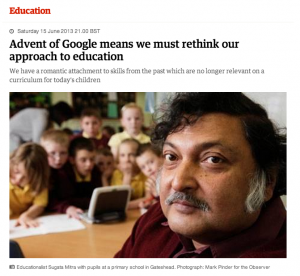career expectations jobhunting life in Japan public policy technology
by sendaiben
13 comments
A future with no jobs -the most important social issue of our times?
I think the most important scientific issues of our times are climate change, energy sufficiency, and environmental pollution, but I believe that these will be solved by technology within my lifetime.
Recently, I have been reading a lot about a problem that will be caused by technological advances.
I read two books: Race Against the Machine ($3.99 on Kindle) and The Lights in the Tunnel ($3.95 on Kindle). They are both incredibly thought-provoking, and tell the same story: we are approaching a future without jobs.
Technological advances are resulting in more and more jobs being automated. Looking around me here in Japan I have seen petrol stations (self-service), restaurants (order from a touch panel) and supermarkets (self-checkout) directly replace workers with machines.
Amazon has replaced countless shops, and is in the process of automating their warehouses.
The latest thing in education is Massive Online Open Courses (MOOCs), allowing one teacher to deliver content to tens of thousands of students.
Foxconn, the company that assembles iPhones in China, is currently replacing it’s workers with robots.
Google’s driverless cars will eliminate taxi drivers, delivery drivers, and eventually driving schools, traffic police, and even street signs.
Increasingly sophisticated computer hardware and software will replace legal researchers, translators, middle managers, medical technicians, surgeons, and other knowledge workers.
So, as technology continues to improve at exponential rates, and human workers for jobs at both the blue- and white-collar levels continue to become surplus to requirements, what are people going to do? Are we going to have societies where 60%+ of the population are on welfare?
It’s terrifying.
I think I’m probably going to be okay, as I work in a public university in Japan (possibly one of the last sectors to face automation). Even so, I would be surprised if my job still existed in 15 years time.
One possible positive to come out of this is that Japan’s extreme demographics may turn out to be a blessing. When there is no need for a workforce, and unemployed people are a drag on society, a falling population could become an advantage.
Am I overreacting? This seems like the issue of our times, as it is going to result in huge changes to our social and economic systems, but it doesn’t seem to be part of public discourse.
I look forward to your comments 🙂
Priorities
As I was cycling to work today, I realised that my priorities are not the things I am spending time on.
I need to make some changes.
curriculum expectations extensive reading language courses Language learning school management self-study TED
by sendaiben
2 comments
New Educational Paradigms
Sugata Mitra’s article in the Guardian on Saturday was very interesting. If you have seen his TED talks (and they are well worth watching), you will know the kind of educational changes he is looking to make.
What struck me is how similar it is to what my collaborator Daniel E. and I are trying to do at Tohoku University. There is a common thread running through our reading, discussion, presentation, and computer classes. We call it ‘practical’, ‘industrial’, or ‘student-focused’ English. To be honest, we haven’t found the perfect descriptor yet 😉
All of the classes are built on the following principles:
1. content and participation are student-generated
2. the bulk of the teacher’s work happens outside the classroom in planning and preparation
3. teachers have a coaching rather than instructional role
4. students are active and spend most of their time using English in pairs or small groups
5. teachers have high expectations regarding student achievement
We’ve mainly been talking about extensive reading so far, but there are plans afoot for a guide to leading discussion classes, with online study and presentation to follow after that. For now, you can catch us at the Extensive Reading World Congress in Seoul in September, or at JALT National in Kobe in October.
Or, you know, leave a comment here if you like!
Oxford Teachers’ Academy
Oxford Teachers’ Academy (OTA) is a teacher training program jointly administered by Oxford University Press and the University of Oxford. Courses normally last three days and there are a number of topic areas. The content of the courses is developed in the UK and delivered by local or international trainers.
OTA has now come to Japan and I’m incredibly excited and honored to be involved in the first course, to be held in Tokyo next month. All the details are here.
The course will be run on a long weekend, from July 13-15 on the Principles of Teaching Young Learners.
conference extensive reading graded readers Language learning presentations Reading
by sendaiben
4 comments
Readability (and the lack of it) in graded readers
At the JALT Pan-SIG conference a few weeks ago (my favourite conference in Japan) I attended two extremely thought-provoking lectures, back to back. Both of them were talking about something very similar, something that has also been coming up in conversations with students this week.
The topic was readability of graded readers, or why some books are easier to read than others.
Marcos Benevides has a great blog post outlining the content of his talk. It’s well worth taking a few minutes to read that now.
Amanda Gillis-Furutaka, from Kyoto Sangyo University, talked about her fascinating research into the specific problems students have when reading English text. Her findings were echoed by my students when I talked to them about their reading in extensive reading classes this week. If you have the chance to attend one of her presentations on this topic at JALT or elsewhere, please consider doing so.
So what makes books difficult for students (focusing on students reading texts up to around 1000 headwords, ie beginner to lower-intermediate readers)? In short, the following:
-number of characters (the more characters the harder it is to understand the story)
-the complexity of the language (modal verbs and allegory are a real barrier to understanding)
-literary devices such as changing between different perspectives, changing from the present to the past suddenly, or unexpected plot twists
While these insights are perhaps most useful to authors and publishers, they can also help teachers recommend books for students (and know which books to put off until later!). Really interesting stuff, and I’m looking forward to reading Ms Gillis-Furutaka’s research when she publishes it.



